Ayurvedic
Amazing Health Benefits and Uses of Ayurvedic Herbs
Table of Contents
Uses of Ayurvedic Herbs:
Ayurveda is the ancient and most traditional medicine system in the world. The treatment in Ayurveda takes a deeper approach in going to the root cause that has been practiced for at least 5,000 years and perhaps as long as 10,000 years. Ayurvedic field not only has a great inventory of herbs and supplements that we are using daily, but it also suggests healthy lifestyle practices – a healthy diet, yoga that aid general wellbeing.
It is well-known that the three doshas – Vata, Pitta, and Kapha are the main pillars in every treatment plan of Ayurveda and these doshas exist differently in every human being and have varying levels of balance according to body types. Therefore, before prescribing Ayurvedic medicines, it is always essential to understand how the doshas exist in a particular human being.
According to Ayurveda, the main key to a healthy lifestyle is by ensuring the functioning of the digestive system. Well-functioning digestion is massively dependent on the Agni or digestive fire. Inefficient digestion results in the production of metabolic waste called Ama and it is the main root cause of diseases.Rather than taking steroid or chemical composed medicines, it is very necessary to use Ayurvedic herbs in managing and preventing different diseases and it is proven that the natural herbs help keep the digestive system in perfect working order without causing any side effects.
Knowledge of the benefits and uses of the Ayurvedic herbs that have been used by our ancestors better enables us to multiple benefits from them. Ayurveda is a science that helps us get more in tune with the natural tendencies of our bodies and to harmonize them.
Importance of Ayurvedic Herbs:
From ancient times, Ayurvedic herbs offered a wonderful solution to all kinds of diseases, even some of which were considered impossible to treat by other medical sciences. Ayurvedic herbs have the potential to maintain a balance between the spirit and the mind.
Some of the major Uses of Ayurvedic herbs are mentioned below:
Ajwain:
Ajwain or Trachypermum ammi is a powerful cleanser and is used as a spice and is the base of many home remedies. Its properties help balance Vata and Kapha and increase Pitta. It contributes to the pungent taste and helps stimulate the appetite, enhances digestion, relieves bloating, gas, and improves the flow of stomach acids. The uses of the Ayurvedic herb Ajwain are given below:
Benefits of Ajwain: 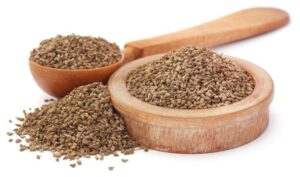
- Ajwain contains a high amount of active compounds, carvacrol, and thymol, that have antifungal and antibacterial properties
- It may lower triglycerides and cholesterol levels and helps in preventing heart disorders
- The active component called thymol in ajwain works as an effective calcium channel blocker thereby helping in lowering blood pressure
- Ajwain is a well-known herb as a home remedy for digestive issues such as abdominal bloating, gas, flatulence, indigestion, etc.
- Ajwain works as an excellent expectorant, and it acts as a decongestant and helps in removing the mucus and clearing the obstructed nasal passage, and helps in breathing easily.
Ashwagandha:
The herb Ashwagandha is highly regarded in the traditional Ayurvedic medicine system. It gets its name from two Sanskrit words – ‘Ashva’ meaning Hoarse and ‘’Gadha’ meaning Smell. The roots of ashwagandha have a strong aroma that is described as ‘hoarse-like’.
This herb can be good for all dosha types and constitutions but is especially used to balance excess Vata and Kapha due to its oily, heating, and strengthening nature. Traditionally, the berries and roots of the ashwagandha plant are used for preparing various Ayurvedic formulations.
Benefits of Ashwagandha: 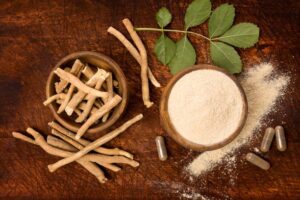
- The root of Ashwagnadha effectively works in improving memory, attention, and cognition power.
- Ashwagandha contains a high abundance of antioxidants that speed up the metabolism, decreases inflammation, and supports healthy weight management.
- The active components of ashwagandha herb appear to stimulate the endocrine system, boosting thyroid hormone levels by reducing cortisol and helping in maintaining the normal functioning of the thyroid gland.
- Studies have shown that Ashwagandha helps in increasing testosterone levels, improves sperm quality, increases the serum levels of luteinizing hormone, and revitalizes the natural balance of hormones in men.
- Being a powerful adaptogen and rich in antioxidant properties, Ashwagandha herb enhances the body’s resilience to stress and helps protect against cellular damage caused by free radicals.
- Due to high abundance of anti-inflammatory properties, ashwagandha may acts as a pain reliever, preventing pain signals from traveling along with the central nervous system.
Brahmi:
Brahmi also called Bacopa monnieri, is one of the oldest Ayurvedic herbs that has been in use from ancient times in managing various neurological disorders. It helps in balancing Vata and Pitta dosha and is cold in potency, astringent, and bitter.
Benefits of Brahmi: 
- The active component of the Brahmi herb helps in improving memory and concentration due to its powerful antioxidant properties.
- Also, it is useful in managing anxiety due to its anxiolytic properties and prevents neuroinflammation which is responsible for anxiety.
- Brahmi herb calms the mind and relaxes the body, thereby effectively preventing the stress hormones from getting aggravated. It boosts immunity by nourishing the body with vital nutrients and antioxidants that help in warding off diseases and infections.
- Bacopa monnieri herb may have anticancer properties and is shown to kill aggressive brain tumor cells and inhibit the growth of cancer cells.
Cumin:
Cumin is a well-known and very popular Ayurvedic herb in many food cultures and is used as whole dried seeds or ground powder. It alleviates Kapha dosha, pungent in taste, hot in potency, improves taste perception, stimulates the digestive fire, and promotes digestion. Cumin is an important component of most of the Ayurvedic medicinal formulations used from ancient times. The major uses of Ayurvedic herb Cumin are:
Benefits of Cumin: 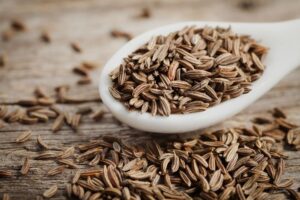
- Cumin contains compounds called flavonoids that work as antioxidants in the body and help neutralize unstable particles called free radicals that cause cell damage.
By neutralization, antioxidants can help in preventing diseases like cancer, and heart diseases. - It stimulates insulin production in the body; therefore, cumin is an excellent Ayurvedic herb for diabetes management.
- Cumin seeds help in burning calories faster by increasing the functioning of the metabolism and improving digestion.
- The medicinal properties of cumin help in decreasing unhealthy blood triglycerides (LDL) while increasing good cholesterol (HDL).
Licorice:
Licorice is very common and rich in medicinal a property that is used for many years to combat various health diseases. Due to coldness and heaviness properties, it effectively balances Pitta Dosha. This Ayurvedic herb is rich in antimicrobial, antioxidant, and anti-inflammatory effects. It is one of the versatile Ayurvedic herbs rich in multiple Ayurvedic properties.
Benefits of Licorice: 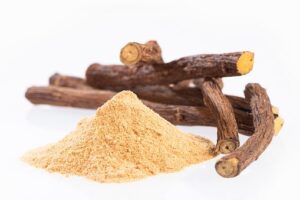
- Licorice herb has anti-inflammatory and ant-microbial effects that help clear respiratory infections such as asthma, bronchitis, etc. It acts as a demulcent and expectorant that helps in getting rid of phlegm.
- Controlling cholesterol is one of the main health benefits of mulethi, it is an extremely effective remedy for lowering the level of bad cholesterol and preventing a person from various heart-related disorders.
- In studies, it was found that licorice assists the adrenals by preventing the breakdown of cortisol, one of the major hormones produced by the adrenal gland to combat tensions and stress.
The active components of licorice help in maintaining energy levels which results in a better response to various stressful situations. - Studies show that the licorice root is rich in some compounds that activate estrogen receptors that help in boosting the levels of hormones in the body. Thus, it effectively eases the symptoms of menopause and can help counteract such uncomfortable symptoms.
Shatavari:
Shatavari is an adaptogenic herb that helps in promoting fertility and offers multiple health benefits, particularly for the female reproductive system. In Ayurveda, Shatavari is termed as ‘queen of herbs’. The herb has a high abundance of antioxidants, anti-depressant, adaptogenic, antispasmodic, anti-microbial, and immunomodulatory properties that make it one of the best choices in the management of various health diseases.
Benefits of Shatavari: 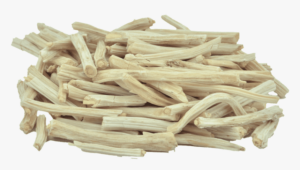
- The herb Shatavari is a well-known galactagogue as it increases the production of prolactin and corticoids which improve the amount and quality of breast milk produced by a lactating mother. Thus, the consumption of Shatavari regularly helps to facilitate and regulate milk production.
- Shatavari herb is high in saponins and anti-oxidant properties that help in the prevention of free-radical cell damage.
- It effectively balances female hormones as well as provides nourishment and strength to the uterus, thus this Ayurvedic herb is a superb fertility tonic for women.
- Shatavari herb also aids to fight urinary tract infections due to its diuretic properties. The anti-bacterial properties of Shatavari stave off infections, and anti-inflammatory properties can soothe burning sensation and irritation.
- The active components of Shatavari can strengthen the immune system, and also help our body and mind to relax and cope with everyday challenges which might cause stress, tensions, and anxiety.
Ayurvedic herbs and spices play an important role in our day-to-day life activities. Though, the medicinal properties and qualities of Ayurvedic herbs protect our body from diseases and offer a variety of health benefits, including improved digestion, detoxification of the body and provide multiple health benefits in physical as well as mental health conditions.
Rather than using chemical-based harmful products, everyone should adopt Ayurveda for the prevention as well as for the treatment of diseases.
For regular health updates, please follow our Social Pages


